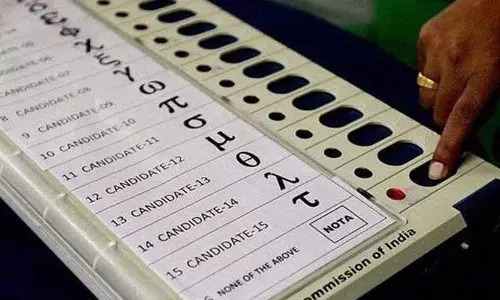
Theresa May changes strategy to offer MPs chance to delay Brexit
text_fieldsLondon: British Prime Minister Theresa May made a dramatic shift in her Brexit strategy on Tuesday and offered MPs the chance vote for a delay to the March 29 exit deadline if her deal failed to clear the House of Commons next month.
In a statement to Parliament, May announced that her government would table a "meaningful vote" on the final withdrawal agreement reached with the European Union (EU) on March 12.
If that vote fails to be passed by MPs, May said she would table an amendment the following day, March 13, for MPs to vote on whether they are prepared to leave the EU without any deal in place.
In the event that MPs reject such an amendment, which is widely expected, a vote will be held on March 14 for MPs to have their say on an extension to the Article 50 process to delay the Brexit deadline. The government would then bring forward the necessary legislation to change the exit date by a "short limited" period.
"Let me be clear, I do not want to see Article 50 extended. Our absolute focus should be on working to get a deal and leaving on March 29," May said in her Commons statement.
"An extension cannot take no deal off the table. The only way to do that is to revoke Article 50, which I shall not do, or agree a deal," she said, effectively offering the UK Parliament a stark choice between her deal, no deal or a delayed Brexit.
The move came as there was mounting rebellion within her own Conservative Party ranks, with ministers within her Cabinet calling for her to take a chaotic no-deal Brexit off the table. Her statement came soon after a Cabinet meeting during which Brexiteer ministers reportedly accused their anti-Brexit colleagues of undermining the Prime Minister and attempting to push her into ruling out no deal.
May's latest set of amendment offerings for next month avoids a defeat for the government on Wednesday, which could see MPs voting to take control of the Brexit process when a series of votes will be held in the Commons.
The British prime minister, who has remained stubbornly opposed to any delay to the Brexit deadline, warned on Tuesday that an extension to the Article 50 process beyond the end of June would mean the UK taking part in the European Parliament elections, which are scheduled for May 23.
She said: "What kind of message would that send to the more than 17 million people who voted to leave the EU nearly three years ago now? And the House should be clear that a short extension – not beyond the end of June – would almost certainly have to be a one-off.
"If we had not taken part in the European Parliament elections, it would be extremely difficult to extend again, so it would create a much sharper cliff edge in a few months' time."
The government's strategic shift came as the Opposition Labour Party also made a significant change in its policy and announced that it would back a second referendum on Britain's membership of the EU.
Opposition leader Jeremy Corbyn said Labour will get behind another referendum if the party can't get its own Brexit proposals of staying within a common EU Customs Union through Parliament on Wednesday. He also said that if May's Brexit deal did get through Parliament next month, Labour would want such a deal to also be put to a public vote – with remaining in the EU as the other option.
"The prime minister continues to say it is her deal or no deal, but this House has decisively rejected her deal and has clearly rejected no deal. It is the prime minister's obstinacy that is blocking a resolution," he told the Commons on Tuesday.
With just a month to go before the March 29 deadline, the UK Parliament remains deeply divided over the nature of Britain's exit from the 28-member economic bloc.
The biggest stumbling block to a withdrawal agreement acceptable to a majority of British MPs remains the Irish backstop insurance policy, put in place by the EU to ensure there would be no hard border between its member-state Ireland and the UK under any future trading arrangements.
However, Brexiteers fear such an insurance policy gives the EU too much power to hold Britain captive to its rules even after it has left the economic bloc.
Any delay to the Article 50 process, triggered in the wake of Britain's referendum in favour of Brexit in June 2016, would have to be backed by all 27 remaining EU member-states. The EU side has indicated its willingness to consider such a prospect if the need arises.
May said her government was preparing for every eventuality and published a paper assessing the country's readiness for a no-deal Brexit and the "very serious challenges" it would pose.
"I believe that if we have to, we will ultimately make a success of a no-deal," she said.
"But this paper provides an honest assessment of the very serious challenges it would bring in the short-term and further reinforces why the best way for this House to honour the referendum result is to leave with a deal," she added.
Opponents of May who support another EU referendum said she had failed to completely rule out a no-deal Brexit.
Newly-formed breakaway Independent Group MP Anna Soubry, who quit the Conservatives in protest of May's Brexit policy, said it was a "shameful moment" and "nothing has changed".























